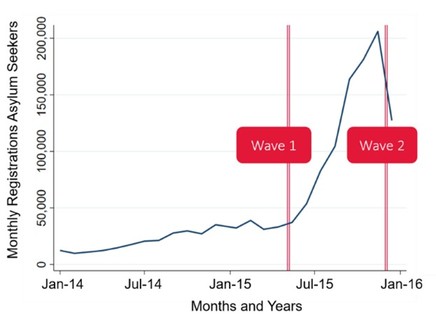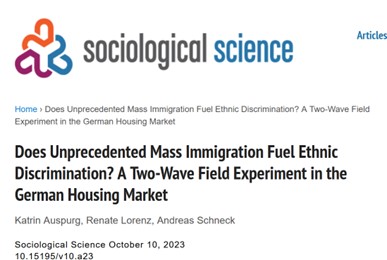More immigration, more ethnic discrimination?
A study by Katrin Auspurg, Renate Lorenz and Andreas Schneck, now published in Sociological Science, comes up with some surprising answers.
17.10.2023
More immigration, more ethnic discrimination?
A study by Katrin Auspurg, Renate Lorenz and Andreas Schneck that examines this question with data on the European "refugee crisis" has now been published in Sociological Science
Does mass immigration increase ethnic discrimination? According to common theories it does, but so far there is a lack of rigorous studies that can measure not only xenophobic attitudes, but also actions (discrimination). An analysis of this relationship is important, not least for immigrants' chances of integration.
In their study published in Sociological Science, Katrin Auspurg, Renate Lorenz and Andreas Schneck use the mass immigration of refugees to Germany in 2015 to examine the impact on ethnic discrimination of Turks in the German rental housing market. In doing so, the authors could use a particularly reliable design: A field experiment conducted shortly before and during the refugee influx using exactly the same methodology for both field periods. E-mail inquiries were sent to about 5,000 apartment advertisements, one inquiry per apartment from a prospective tenant with a Turkish name and account, and one from a prospective tenant with a German name and account. Since exactly the same method was used both times (before and during the "refugee crisis"), possible changes in the extent of unequal treatment (discrimination) are very likely attributable to the immigration that has taken place in the meantime.
The result is surprising: As expected, e-mail inquiries from German prospective tenants were more often answered positively, which is considered an indication of ethnic discrimination (more difficult access to housing for Turkish persons: In 14-15% of the cases, only the e-mail of the German was answered; while in 4-5% of the cases, only the e-mail of the Turk was answered, resulting in a so-called "net discrimination" of 10 percentage points). But did the extent of discrimination measured in this way increase during the unexpected influx of refugees? Surprisingly, no! The net discrimination rates are the very similar at both measurement points ("wave 1" vs. "wave 2") (see figure below). Turks had a harder time getting an invitation to view an apartment also at the second measurement; but according to the findings of the study, the refugee influx (or the critical media discussions of the "refugee crisis" associated with it) did not exacerbate the level of housing discrimination.
Figure 1. Timing of the two waves of the experiment and observed level of discrimination


The unchanged level of discrimination even applies to regions in Eastern Germany, which have so far been little accustomed to immigration and for which theories therefore, suggest particularly strong effects.
Overall, the study thus shows that an increase in immigration and xenophobic attitudes (as observed during the refugee crisis in Germany) does not necessarily translate into more discrimination, which challenges previous assumptions. For more implications and details on the study, see the journal publication:
Katrin Auspurg, Renate Lorenz and Andreas Schneck (2023): Does Unprecedented Mass Immigra-tion Fuel Ethnic Discrimination? A Two-Wave Field Experiment in the German Housing Market. So-ciological Science October 10, 2023; 10.15195/v10.a23 (https://sociologicalscience.com/articles-v10-23-640/)


